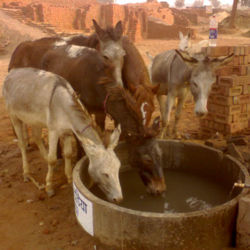Water Requirements - Donkey

On average about 60% of the donkey’s body is made up of water, about 82% of the blood volume is water and even 25% of the weight of bone is water. Every biological reaction of the body requires water as a solvent. Water is required to move nutrients and oxygen around the body to where they are needed and to remove waste products to the lungs and kidneys. Water deprivation depresses appetite and, therefore, reduces the intake of other essential nutrients. In terms of the rapidity of the development of deficiency symptoms, water is probably the single most important nutrient. However, it is the one that is most often overlooked, with keepers often underestimating a donkey’s daily requirement for water or not appreciating the reluctance of an animal to drink from containers contaminated with urine, faeces, saliva or algal slime.
Donkeys have evolved in semi-arid environments and are well adapted to cope with thirst and rapid rehydration. They are able to tolerate and quickly recover from body water losses of up to 30% of their normal body weight, then rehydrate rapidly by drinking 24 to 30 litres of water in two to five minutes without ill effect. Donkeys are more thirst-tolerant than ponies, and will maintain food intake even when deprived of water for long periods. However, this short-term tolerance of thirst should not be confused with the long-term requirement for water.
The overall water requirement of donkeys is similar to that of horses. The general rule is that animals should always be provided with free access to clean water throughout the day. The best way to provide this is by selffilling water troughs which should be regularly cleaned. Providing water in buckets is hard work for the keeper and the buckets are highly likely to be contaminated or knocked over unless secured by some means. When donkeys are used for work they should be given frequent opportunities to drink during the working day and given free access to water during the night.
References
- Smith, D. and Wood, S. (2008) Donkey nutrition In Svendsen, E.D., Duncan, J. and Hadrill, D. (2008) The Professional Handbook of the Donkey, 4th edition, Whittet Books, Chapter 1
|
|
This section was sponsored and content provided by THE DONKEY SANCTUARY |
|---|